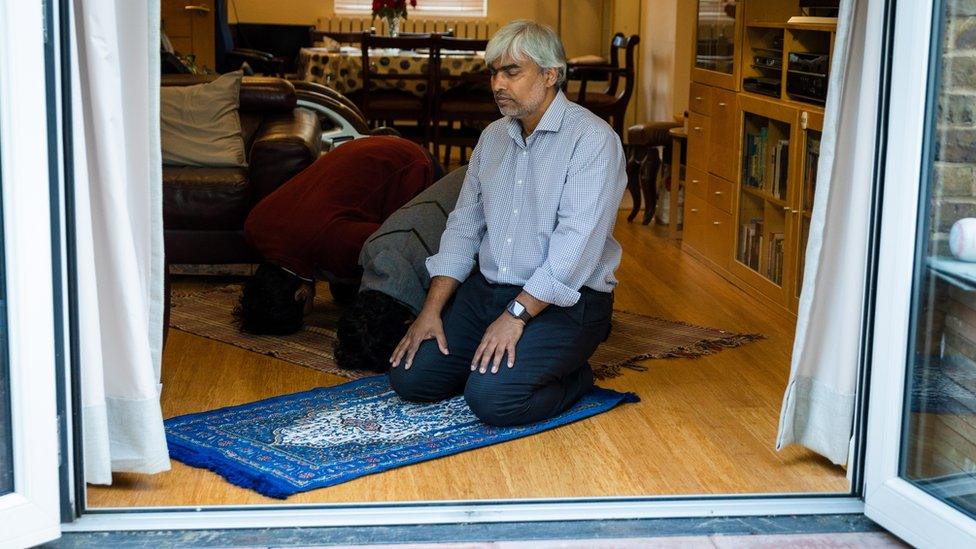Coronavirus: Places of worship set for public services
- Published
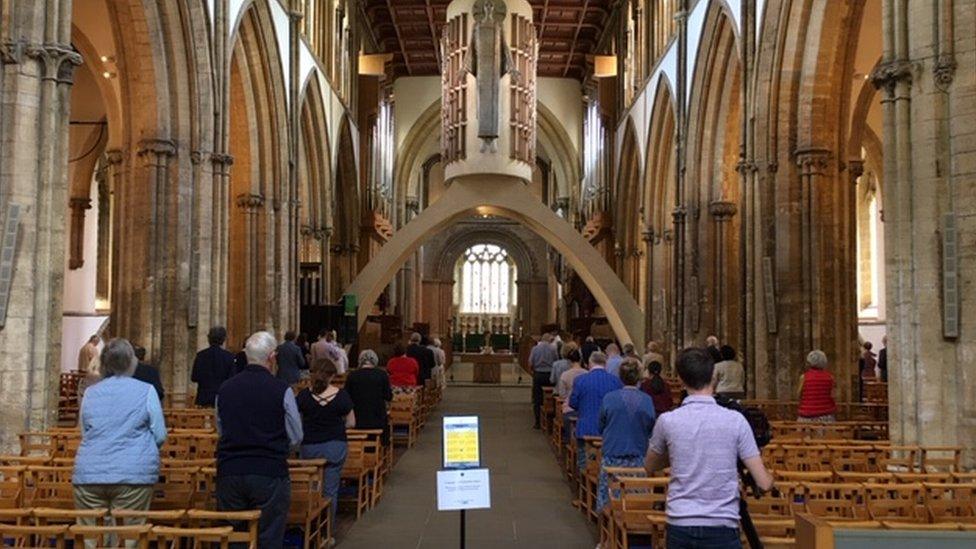
The congregation followed social distancing rules at Llandaff cathedral as they attended Sunday service
Places of worship in Wales have begun reopening for services for the first time since lockdown began.
Gatherings of more than 30 people are now allowed for acts of communal worship in churches, synagogues, mosques, temples and meeting rooms.
The decision has been welcomed by faith leaders across Wales as a "huge second step" after private prayer was allowed.
However worshippers of all religions are likely to notice major changes, including a ban on collective singing.
Everyone attending must follow social distancing guidelines and remain 2m (6ft) away from anyone not from their own or extended household.
A risk assessment will have to be carried out at each place of worship and anywhere too small to safely admit a congregation might be able to arrange a larger gathering outdoors for up to 30 people.
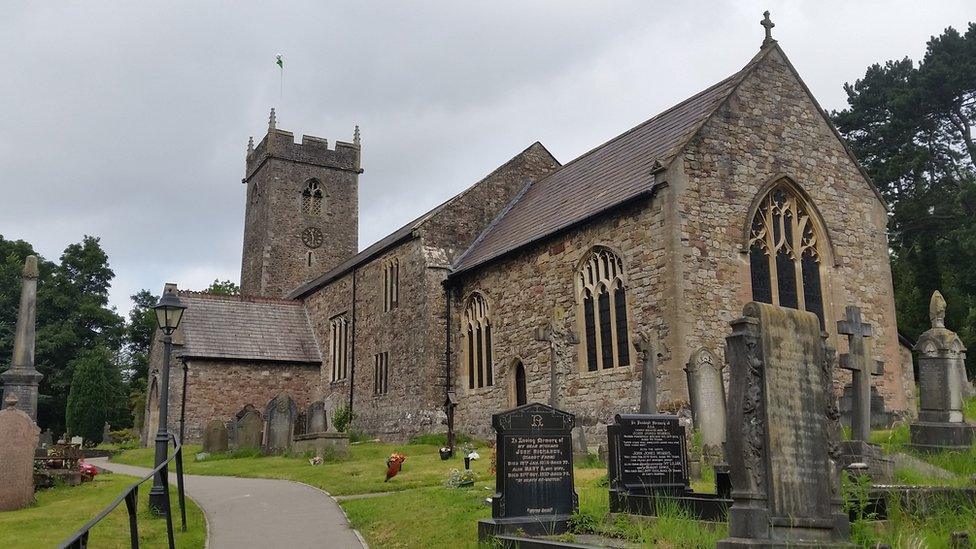
Worshippers noticed changes on returning to churches
Some ministers may even opt to wear personal protective equipment (PPE).
What does the Welsh Government say?
While opening the doors for group worship, the Welsh Government said those responsible were "under a duty" to minimise the risks.
It said people were expected to observe social and physical distancing and good hand and respiratory hygiene.
"Places of worship play an important role in providing spiritual leadership for many individuals, and in bringing communities together," it said in the latest guidance., external
"However, their communal nature also makes them places that are vulnerable to the risk of spreading coronavirus."
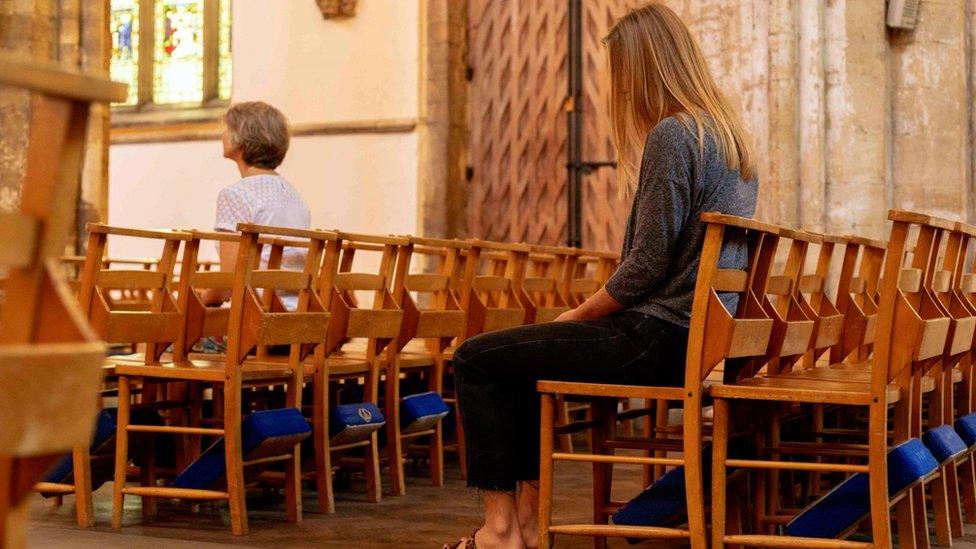
Fewer numbers are allowed in due to social distancing
What else has changed?
Names and addresses taken for potential track and trace
Entrances and exits should be managed
A one-way system introduced to avoid people congregating in small areas
Shared articles such as prayer mats, hymn books, collection plates should be removed and individuals encouraged to bring their own
If shoes are removed before a service, people should avoid touching other people's
The decision to reopen places of worship has been broadly welcomed by religious leaders, although they are approaching it with different degrees of caution.
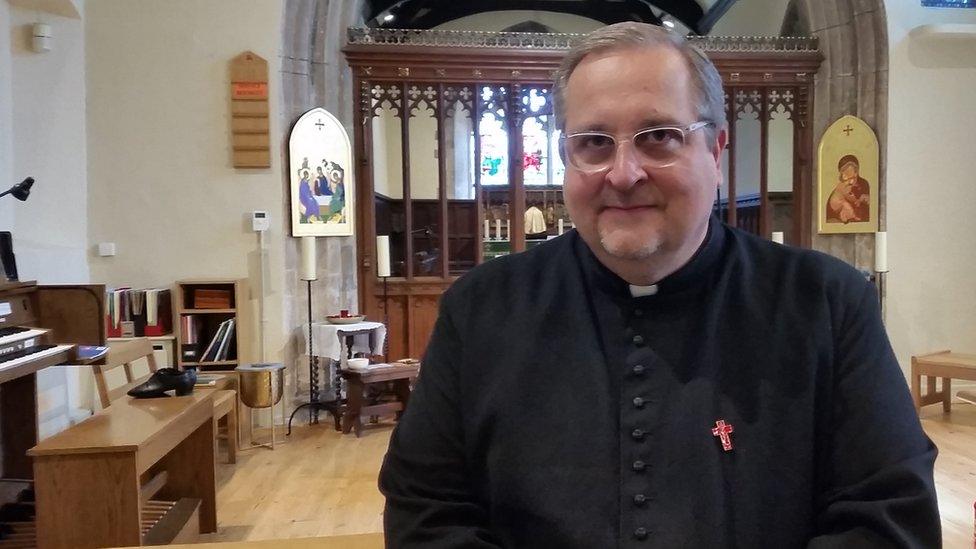
Father John Connell was expecting it "be emotional" when he welcomed people back
Anglican churches
The Church in Wales has issued guidance, external saying a cautious approach was "essential" and not all churches would be able to reopen.
The Archbishop of Wales, John Davies, said: "We cannot be complacent or reckless. We must proceed with caution and care and worship will be different from that to which we have been accustomed in the past.
"Making preparations to be open will involve a lot of work and paying attention to some very technical guidelines but will be hugely appreciated by those who, until now, have not been able to participate in worship with others."
Many churches will continue online services for those who still cannot attend services.
There are also restrictions on the giving and receiving of Holy Communion:
No sharing of wine
The bread host only to be received by hand, not in the mouth
The priest must use hand sanitiser before and after giving communion
Among other restrictions, worshippers will not shake hands during the sign of peace.
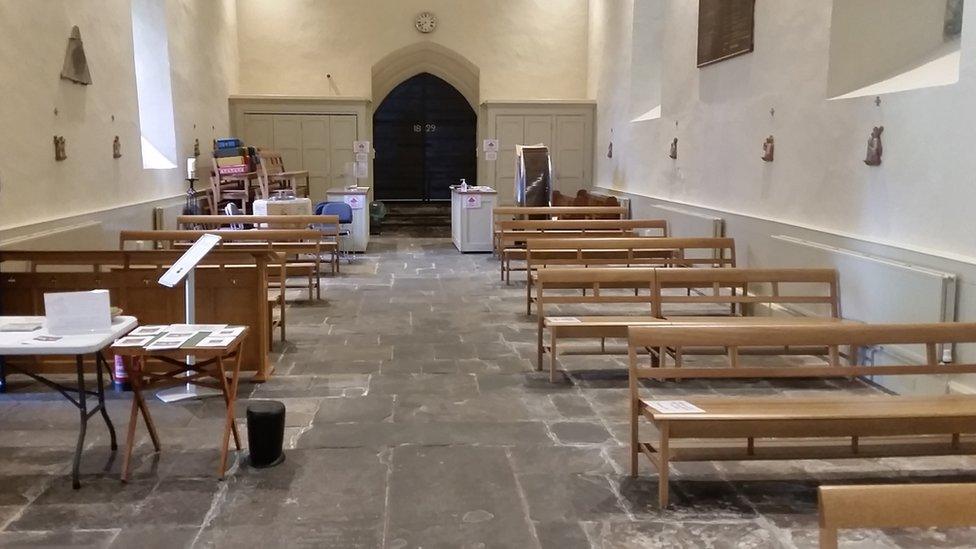
Pews inside St Augustine's Church have been spaced out to allow social distancing
Roman Catholic churches
Since the crisis began, Roman Catholics have been freed from their obligation to celebrate Mass every Sunday.
Cardinal Vincent Nichols, the church's leader in England and Wales, has said this will continue despite the changes.
The Catholic Bishops' Conference of England and Wales also says, external there should be no offertory procession or collection, and parishioners should be encouraged to give online instead.
Hindu temples
The Hindu Council of Wales said it remained "too early" for most temples to take advantage of the new rules.
About 300 people normally attend the largest Hindu temple in Wales - Shree Swaminarayan in Grangetown, Cardiff - but social distancing means it is still limited to 10 men and 10 women.
It is the only temple that is open every day, though a second, in Splott in Cardiff, is to open on Sunday for the first time since lockdown.
"It doesn't make a big difference because we're very limited and don't want to chose who is more important to allow in," said vice chairman Karsan Vaghani.
"Our faith is all about communal worship and being in the temples to see and bathe the idols. However they are not just places of worship, they're social centres for our community which everyone has greatly missed."
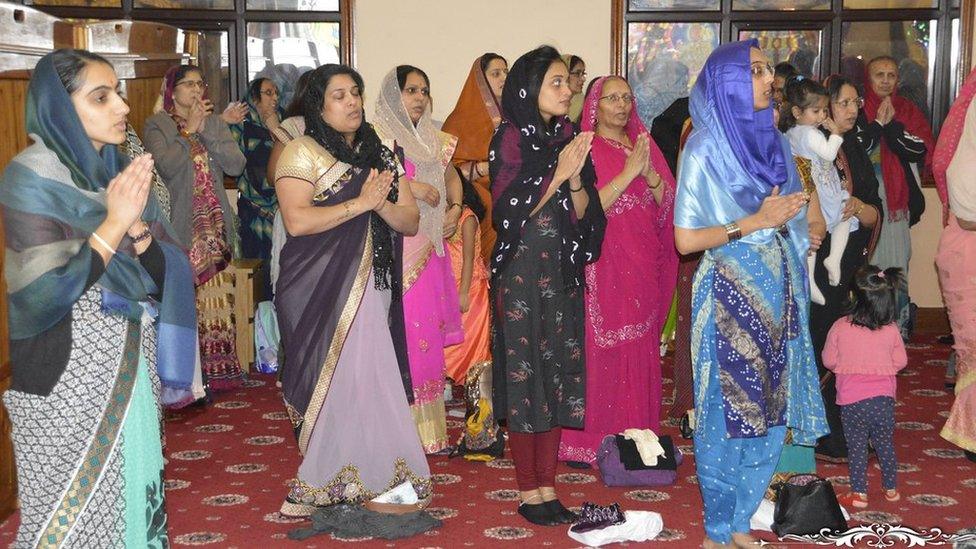
Wales' largest Hindu temple is currently limited to 20 people
Mosques
The Muslim Council of Wales, external has called for more guidance though it has welcomed allowing local faith leaders to make the decision on whether or not to open.
It said reopening the 47 mosques in Wales would be a "slow" process though it expected two-thirds to have some public services, at a vastly reduced capacity, running within the next week.
"It's a matter of when and how they will reopen, rather than if," said secretary general Abdul-Azim Ahmed.
"Places of worship are an important part of people's lives and reopening them is another opportunity to resume their lives. Having a congregation is very important in our faith and we will look at a series of compromises, such as outdoor services or smaller groups."
Its plan for safe reopening, external advises worshippers to wear face masks and bring their own prayer mat, Quran, and a reusable shoe bag.
However staging celebrations for the annual festival Eid al-Adha, between 30 July and 3 August, will be a "huge challenge".
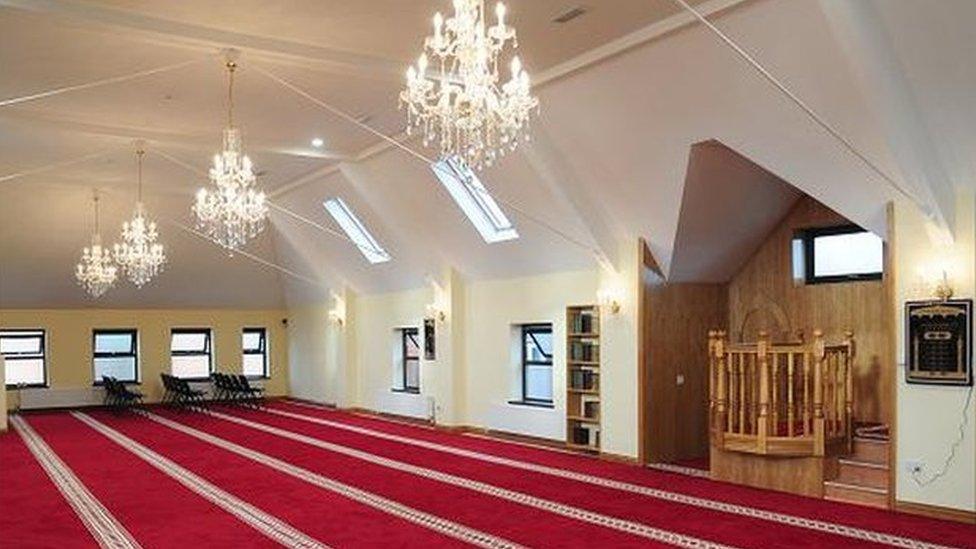
The Dar Ul-Isra mosque in Cardiff was expecting to be at only a quarter of its capacity
Synagogues
Under orthodox Jewish law, services on the sabbath are not permitted to be streamed online as they require the presence of at least 10 men.
The United Synagogue has issued a list of practical considerations, external for reopening safely. This includes:
An online booking system for attendance at synagogue
No kissing of holy books or objects, and no handshaking
Face masks to be worn inside
Singing to be restricted to the service leader, who will face away from the congregation
"We are going to have to maintain the high standards of orthodox Jewish law but adapt the service to ensure we comply with the Welsh Government's guidelines," said Lisa Gerson, chair of Cardiff United Synagogue in Cyncoed.
"It was a hard to decision to close but it will be an even greater challenge to reopen."
Cardiff's Reform Synagogue also remains closed.

A SIMPLE GUIDE: How do I protect myself?
AVOIDING CONTACT: The rules on self-isolation and exercise
HOPE AND LOSS: Your coronavirus stories

- Published12 July 2020
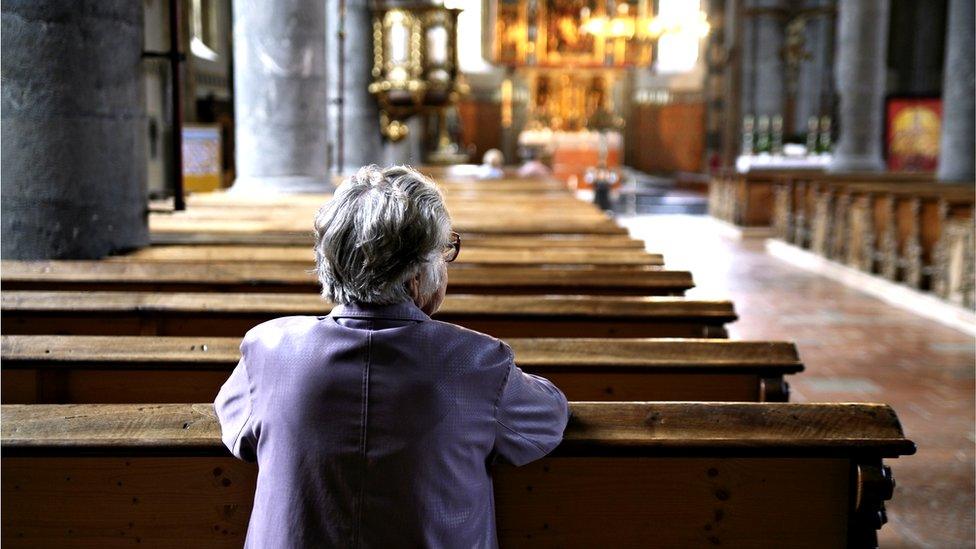
- Published12 April 2021
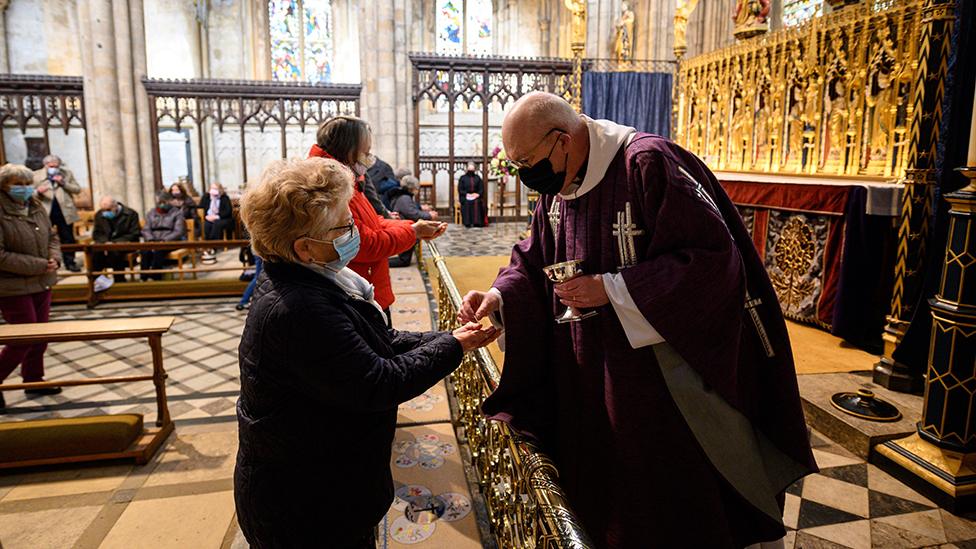
- Published7 June 2020
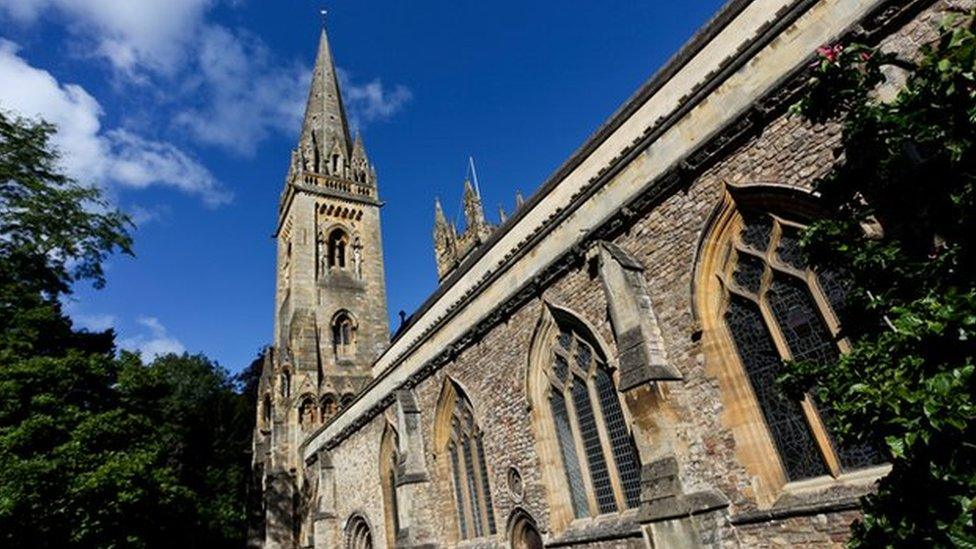
- Published7 June 2020
